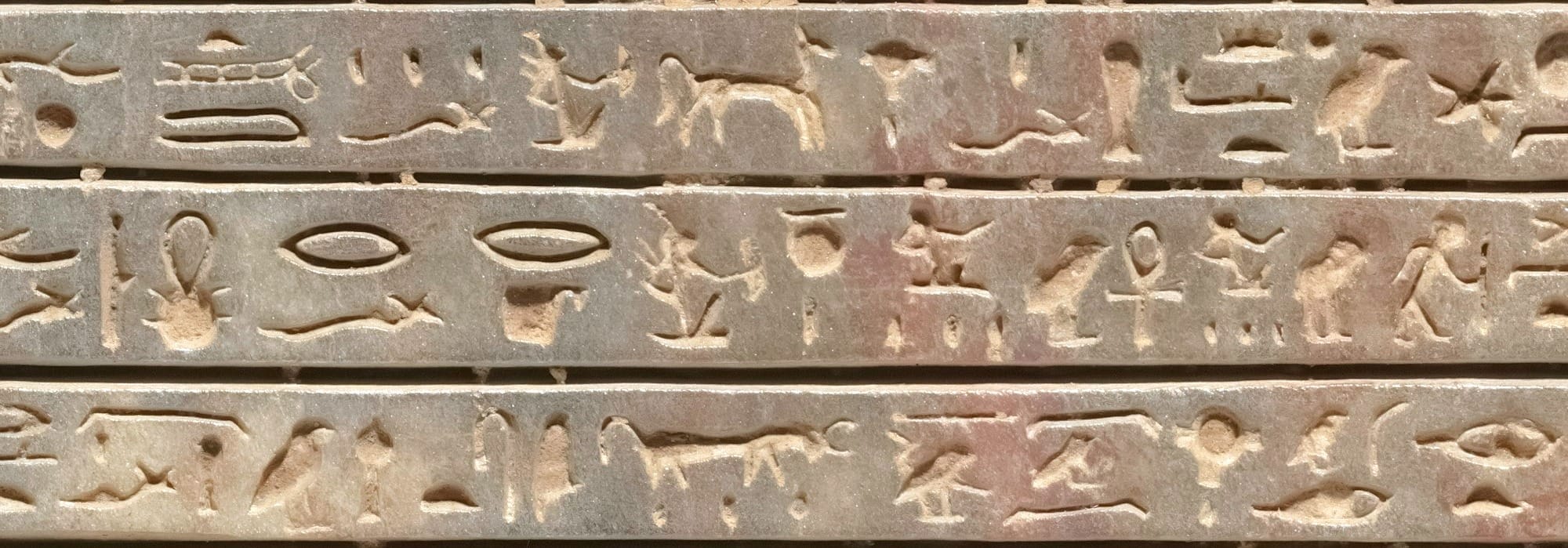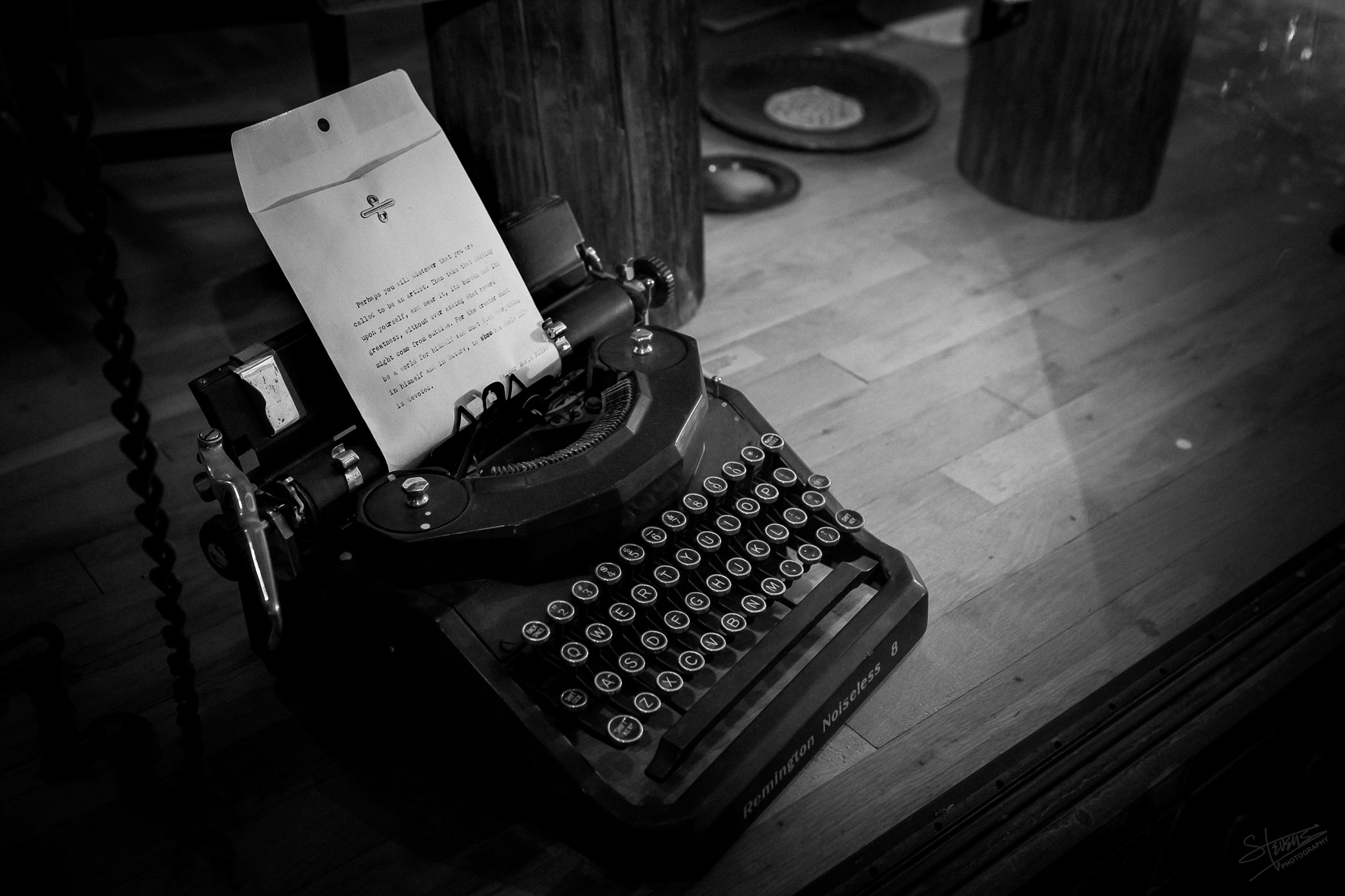Typewriter at the Alpine Artwalk
"That’s what your grandpa used before computers.”

A few years ago, during Alpine’s annual Artwalk, I found myself lingering in front of a dusty storefront window, drawn by the soft glow of a single desk lamp illuminating an old Remington Noiseless. Its black metal frame seemed to carry the weight of a hundred untold stories. There, perched on the platen, was a small, yellowing envelope stamped with a Rilke quote.
I lifted my camera and framed the scene: the round keys gleaming, the ribbon spool half unwound, the envelope poised as if waiting for a final keystroke.
I slipped closer, reading:
“Perhaps you will discover that you are called upon to be an artist. Then take that destiny upon yourself, and bear it — its burden and its greatness — without ever asking what reward might come from outside. For the creator must be a world for himself, and find everything in himself and in nature, to which his whole life is devoted.”
In that moment, the rattling keys, long silent, seemed to whisper across the decades. As an artist, I felt Rilke’s words settle over me like a benediction — a reminder that art is both privilege and weight. As a man, I recognized the quiet tremor of responsibility beneath that blessing, the necessity to source every spark of creativity from within, to trust my own inner landscape before seeking echoes in the world.
I lifted my camera and framed the scene again: the round keys gleaming, the ribbon spool half unwound, the envelope poised as if waiting for a final keystroke. I wanted to capture that fragile intersection of memory and possibility — the way an unassuming window display could become a mirror, reflecting your own calling back at you.
Sharing this image now, I hope you can feel that same light breeze of conviction that found me on that Alpine sidewalk. The typewriter stood there, silent and steadfast, a testament to every artist’s fate: to carry our purpose forward, unshaken by expectation, and to trust that in bearing our own burden, we discover the boundless world within.
The stories hidden in the keys
What the camera couldn’t record was the hum of the street behind me — a mix of fiddle tunes leaking from the Reata restaurant courtyard, the smell of brisket drifting from food trucks, and the low murmur of locals discussing which gallery served the best sangria. Alpine’s Artwalk is part art fair, part block party, part family reunion. From the corner of my eye I watched a boy no older than ten tug his father’s sleeve, pointing at the Remington.
“Is that a computer?” he asked. The father chuckled. “No, buddy — that’s what your grandpa used before computers.” The boy’s eyes widened, and for a heartbeat he looked at the typewriter with a reverence usually reserved for dinosaur bones.
That exchange lodged in me. The machine behind the glass wasn’t merely antique décor; it was a relic of effort. Each metal arm carried a single letter and a faint memory of every hand that ever pressed it. Inked ribbons, carbon paper, blots of white-out — all the ghosts of revision lingered in that dim display.
I wondered who had left the Rilke envelope. A shopkeeper? A poet passing through? Maybe it was a local teacher reminding students why they bother to wrestle sentences into shape. Whoever it was understood that a quiet window can speak louder than any bullhorn.
My own apprenticeship with iron and ink
I learned to type on a different Remington — a hulking, battleship-gray Standard in my high school typing class. It sounded like a firing range when a roomful of students practiced. If you didn’t strike the key dead center, the typebar would skip and leave a ghost impression. That machine taught me rhythm and consequence: hit with conviction or start over.
Years later, when I bought my first laptop, the absence of that mechanical resistance unsettled me. Words slid onto the screen too easily, as if effort were optional. Seeing the Noiseless in Alpine brought back the delicious friction of iron against ink and paper — the reminder that creating anything worthwhile leaves fingerprints, smudges, and a faint metallic tang on the air.
The envelope’s challenge
I copied the quote into my notebook and slipped my own card under the shop door — a silent thank-you to the mystery curator. Then I walked the length of Holland Avenue, camera down, simply looking. A neon cactus flickered above a brew-pub. A painter dabbed final highlights onto a jackrabbit portrait while customers milled around her easel. A ranch hand in dusty boots tapped a rhythm on the gallery’s porch rail, half-listening to a bluegrass trio warming up. Everywhere I turned, someone was making something with their hands.
Rilke’s charge rang louder with each storefront: bear your destiny, its burden and its greatness. It’s easy to chase applause, to check likes and follows, to treat creativity like a vending machine — insert effort, extract rewards. The envelope insisted on a harder truth: the work must be its own justification. The real payment is the moment the keys fall, the shutter clicks, or the brush lifts — when you feel the world inside you line up with the world outside for a breath or two.
Leaving the window
Twilight fell, and string lights blinked on above the street. A chill crawled in from the Davis Mountains, nudging tourists toward coffee stands. I circled back to the Remington. The lamp still glowed; the quote still rested on the platen. Yet the scene felt altered, as if acknowledging my return. I framed one last shot, slower this time, letting the exposure drink in every shadow.
Before I walked away, I noticed a faint smudge on the glass: the ghost of someone’s fingertip, exactly where the “A” key lined up behind the pane. Maybe another photographer. Maybe the boy who’d asked about computers. Either way, it pleased me. The stories in that window were still multiplying.
Carrying the weight home
I keep a print of that final frame above my desk. On days when pixels blur and deadlines loom, the picture whispers the same benediction Rilke offered: Find everything in yourself and in nature. Devote your life to it. Some mornings that feels like a dare; some nights it feels like a lullaby. Either way, the weight is mine to carry.
If you ever find yourself in Alpine during Artwalk, hunt for the dusty storefront near the railroad tracks. The Remington may still sit under that lamp, or maybe the display has changed. Doesn’t matter. Pause anyway. Peer through the glass. Let the quiet invent its own soundtrack. Then listen for the faint rattle of keys reminding you — as they reminded me — that the stories we’re called to tell will wait only so long before they ask someone else.
Which forgotten tool still whispers to you when you pass it by?
— Lawrence

Thanks for reading Still Stories! Subscribe for free to receive new posts and support my work.

